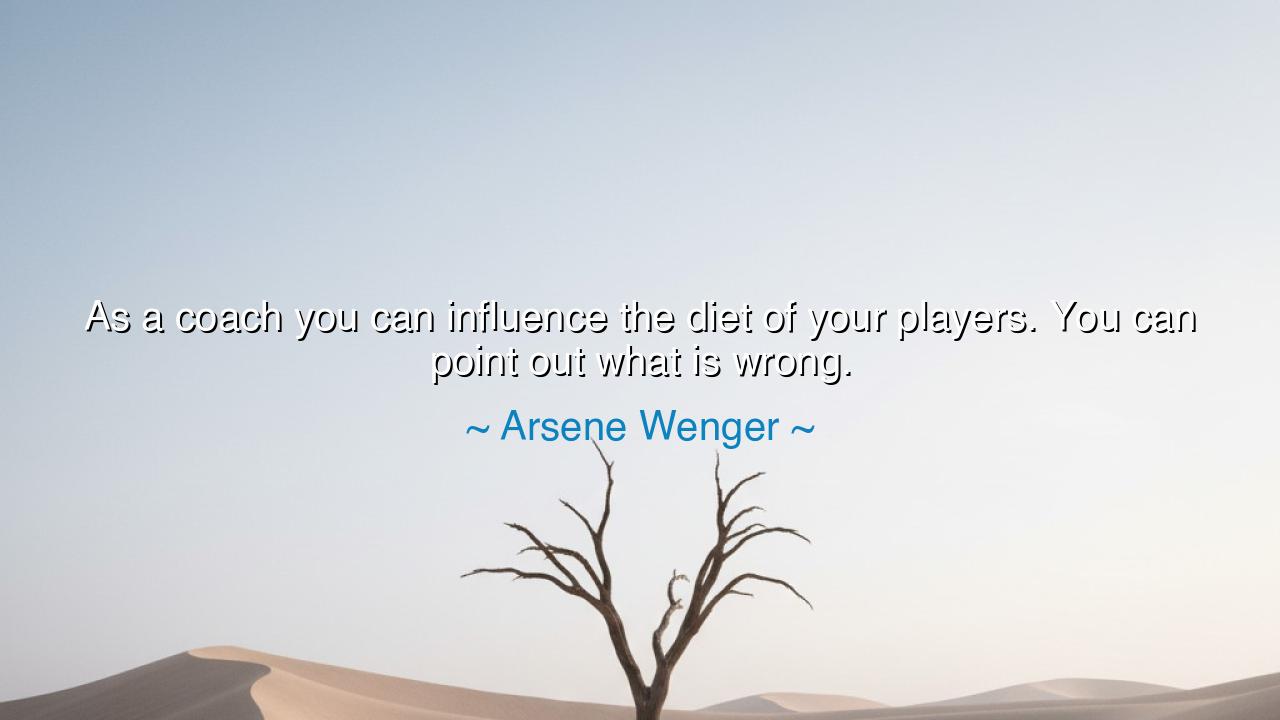
As a coach you can influence the diet of your players. You can
As a coach you can influence the diet of your players. You can point out what is wrong.






In the thoughtful words of Arsène Wenger, a master of both intellect and sport, we are offered a reflection that reaches far beyond the realm of football: “As a coach you can influence the diet of your players. You can point out what is wrong.” Though spoken in the context of athletic discipline, these words hold a wisdom that belongs to every leader, every teacher, and every soul who seeks to guide others toward excellence. Wenger, a man revered for blending philosophy with the precision of the game, reminds us that true leadership is not the domination of will, but the cultivation of awareness—that the role of the mentor is to influence, to reveal, to awaken understanding rather than impose control.
To speak of diet is not only to speak of food; it is to speak of nourishment, of the choices that sustain the body and sharpen the mind. A coach may instruct a player on passing or tactics, but when he shapes what his players consume—when he awakens them to what strengthens and what weakens—he becomes something greater: a guide of life itself. Wenger’s insight reflects the ancient truth that discipline is holistic, that no man can master his craft while neglecting his body. In this way, the diet becomes a metaphor for all habits, all inputs that shape one’s destiny. As one eats, so one becomes; as one thinks, so one acts. The wise coach, therefore, does not simply train performance—he tends to the roots from which performance grows.
The ancients, too, understood this sacred duty of mentorship. In the schools of Athens, Plato and Socrates taught not by dictating answers, but by asking questions that nourished the mind. They “pointed out what was wrong” not with anger, but with precision and care, guiding their students toward self-realization. Similarly, Wenger’s words reflect the teacher’s eternal role: not to command the student’s will, but to align it with wisdom. For as the philosopher cannot force enlightenment, the coach cannot force discipline. He can only show the path and trust that his guidance, once received, will take root in the hearts of those he leads.
In his career, Wenger was known for revolutionizing the culture of English football—not by mere strategy, but by transforming how his players ate, trained, and thought. When he arrived at Arsenal, he found athletes fueled by processed meals, heavy meats, and carelessness toward recovery. He did not scold; he influenced. He brought knowledge, structure, and vision, showing his players that the smallest choices—the food they ate, the rest they took—were the foundation of greatness. This quiet transformation, born not of authority but of wisdom, turned a club into a dynasty. It was not the command of a tyrant, but the insight of a teacher that reshaped generations of athletes.
Wenger’s statement carries within it a moral beyond sport. It teaches that leadership is a sacred act of stewardship—of guiding others toward alignment with what is true and beneficial. The leader cannot live for those he leads, nor can he eat or train in their place. His power lies in his ability to reveal the unseen, to help others discern what is right and wrong for themselves. The coach, the teacher, the parent—all share this role: to cultivate discernment, to awaken responsibility, and to inspire discipline born not from fear, but from understanding.
There is, too, humility in Wenger’s words. He admits that the coach can only “point out what is wrong”—not correct it by force. This acceptance of limitation is the mark of the wise. The ancient Stoics, such as Epictetus, taught that control extends only to one’s own actions; all else must be guided with patience and faith. Wenger’s wisdom mirrors this philosophy: influence where you can, illuminate where you must, and trust that truth, once shown, will guide others forward. The task of leadership is not perfection, but presence—to stand as a mirror, reflecting clarity to those who have lost sight of it.
Thus, the lesson is clear: to influence is nobler than to impose. Whether in sport, art, or life, the one who guides others must seek not to dominate their choices, but to strengthen their wisdom. Feed those around you not with orders, but with understanding. Show them what harms, but also what heals. In this way, you cultivate not obedience, but mastery.
And so, let the words of Arsène Wenger echo as an ancient teaching for the modern soul: tend to your own discipline that you may inspire it in others; nourish your own mind and body that you may lead with integrity; and when you see error, point it out with compassion, not pride. For the mark of a true coach, as of a true sage, is not in his power to command, but in his ability to awaken the best within those who follow him. Only then can leadership transcend authority and become what it was always meant to be—a sacred act of transformation.






AAdministratorAdministrator
Welcome, honored guests. Please leave a comment, we will respond soon